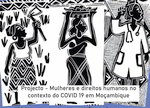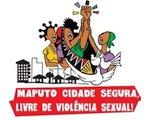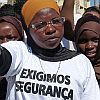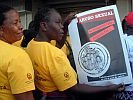Polygamy: All in the Name of “Tradition”
Opinion
Yolanda Sithoe
Between July and December 2007 I had the opportunity to participate in fieldwork in Maputo and Manica provinces, for research entitled “Family Forms and Domestic Violence”. It was an extremely important opportunity that put me in touch with other experiences and realities in the country, about which I merely suspected but did not know in reality.
We interviewed the study’s target groups: teachers, peasants, informal vendors and their respective spouses (or partners), as well as community leaders in both urban and rural areas.
In addition to misery and poverty (for which there appears to be no solution, as there are no prospects of local solutions), and regional asymmetries (poverty outside Maputo city and province is even worse), I was deeply affected by having witnessed what for me, until then, had been a distant reality, even though I had heard about it in primary school. For example, back then in history lessons we learned that our ancestors had more than two wives, each with her own home, children, etc. This form of marriage is called polygamy (later I was to learn that the correct word is polygyny). I later discovered that it still exists today, but there are no studies discussing its prevalence and how this form of marriage has adapted itself and survived in current contexts.
Despite the absence of these studies, polygamy is the source of major heated public debate, filled with emotion, and one gets the impression that the more the subject is discussed the more divergent the outcome, or rather, the less the consensus. Among others, it is a subject that was discussed a great deal during approval of the new Family Law in 2004. In debates there were those who argued that it should be legalized because, they said, Mozambican tradition and culture must be preserved.
So what is Mozambican culture? Who makes Mozambican culture? Who legitimizes Mozambican culture? According to Giddens (2000: 46-47), culture comprises the values of a given group of people, the norms they observe and the material goods they create. Norms represent what is “permitted” in social life. So culture is everything that is not nature, i.e. everything that is produced by human beings. For example: land is nature and planting is culture. Culture is thus the intellectual development of the human being, the customs and values of a society. In the name of culture nothing is questioned, nothing is criticized and reflections on the possible impact of certain situations are avoided. Because, normally, what is considered a culture and a value to be preserved, is imposed (even though it does not appear to be an imposition) by the dominant groups in society.
Polygamy is justified in Islam on the grounds that it protects the woman, and that it is in a man’s nature to be a polygamist and a woman’s to be monogamous1. In Mozambique, the defenders of “our African culture” say that one of the factors that encourages polygamy is the enormous value placed on motherhood.
However, in private conversations with friends, these arguments are used to justify men’s interests. This is because whenever the subject is polygamy, only men defend it, even stating that they “are doing women a favour”. As they are many, there must be equilibrium in society. These are the words of men of various origins, ranging from those who have little education to university graduates, intellectuals etc. When the subject is raised, they refuse to recognize that culture is dynamic and that, as societies evolve, other values appear and a new awareness of rights is created.
Returning to the fieldwork experience, it was in the districts (although this is not to say that this practice doesn’t exist in towns) that the polygamy issue shocked me most, because of the extent to which is interiorized and socially accepted. I found 24 year-old primary teachers who already had two wives and had been living in a marital situation (marriage and de facto union) for over three years. When asked why, they replied, “the first one was unable to have a child, so I had to arrange another”. Among peasants and vendors the situation was justified by replies of the type: “I needed someone else to help in the fields because it is very hard work, I have 2, 3 fields and it is difficult to cultivate them alone”.
It was strange that when I started the interview by asking the names of the respondents’ wives, they just gave me the name of one wife and it was only during the course of the interview that they revealed they were polygamists. This is because the second and third wives have little value and prestige (or maybe they omitted this information, perhaps because they suspected we wouldn’t like it). I saw that they were merely “cheap labour”. All rights and privileges belong to the first wife who, even so, is submissive to her husband, such that he orders her to control the others when he is not around.
Many men say that the women like it and are not bothered by the fact that their husband is a polygamist: “she even went and brought the other women here”. This is not true because later, when their wives were interviewed, they said they did not like the situation but there was nothing they could do: “even if I don’t want it, he will not listen to me, he has to have other women”. This is why it reaches the point where she herself chooses her “rival”. I suppose they could be strategies or manipulation by some women who perhaps prefer to share their husbands with their sisters rather than with outsiders. Not because they like it, not because they accept it, but because they have no alternative. He has symbolic power over them that, according to Bourdieu (1989), arises as does all power that manages to impose meanings, and impose them as legitimate. This power is rooted in culture and in tradition, through socialization.
This type of norm, of obedience and servitude, is inculcated in a woman very early, through socialization. She obeys figures of masculine power without question: when she is a child, her father, and later when she marries, her husband.
She is unaware of her rights as a human being and that, just like a man, she can and must decide about her life, about what is important for her and for her family. Although she doesn’t like it and is unhappy, in the name of this tradition she is forced to live together with two or more women in the same yard. Unfortunately, this happens because she does not know that, under Mozambican law, polygamy contradicts one of the essential rules of marriage, equality between the spouses and that, for this reason, it is a right not to be subject to such a humiliating situations.
I think we must have the courage to confront our past and reject those aspects of our traditions and customs that clearly violate human rights, and in particular WOMEN’s rights.
- Information obtained from Opinião e notícia, entitled “Polygamy, causes, consequences and curiosities”, 20 December 2006. Acessed 20 April 2008.
References:
GIDDENS, Anthony (2000). A Sociologia. FCG, pp. 46-47.
BOURDIEU, Pierre (1989). O Poder Simbólico. Paris, Difel.
* * *







 Information in English
Information in English



















